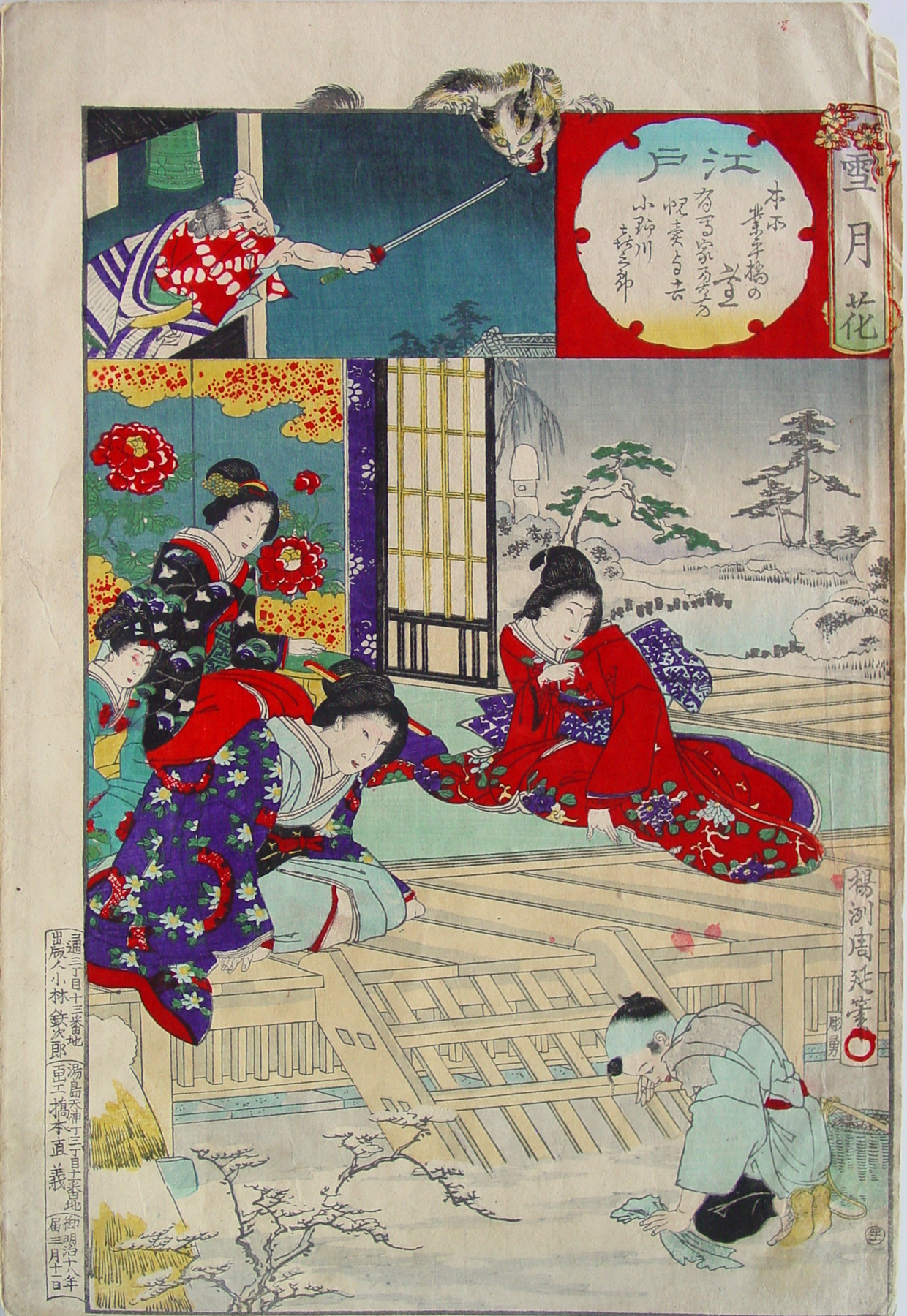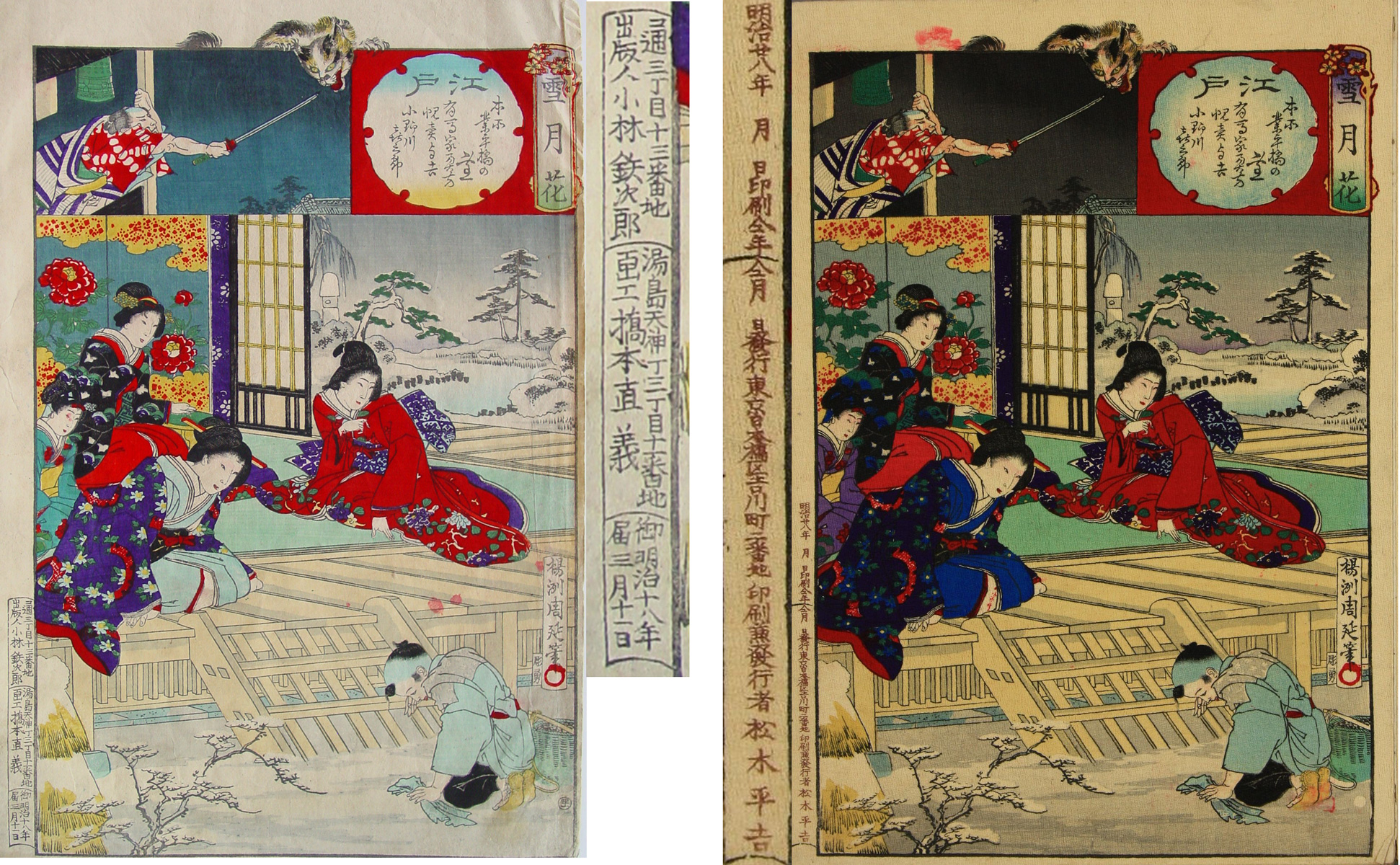About This Print
Source: Chikanobu: Modernity and Nostalgia in Japanese Prints, Bruce A. Coats, Hotei Publishing, 2006, p. 104.Both scenes in this print are from the story Arima no neko. In the bottom portion of the print, "[t]he little boy Yokichi has heard that his sister Otaki, who was sold into prostitution, has committed suicide, and he comes to the Arimaya brothel to find out more information.
In the inset, "Onogawa Kisaburo fights off the monster cat, formerly the pet of Otaki," who has come to take revenge for his dead mistress.
"Chikanobu’s fifty-print series Setsugekka [Snow, Moon, Flowers] was published between August 1884 and April 1886. The term setsugekka / setsu getsu ka derives originally from a poem by the famous Tang-dynasty poet Bo Juyki (772-846), which was in turn included in the Heian-period anthology Wakan rōei shū:
Lute, poetry, wine – my friends
all have deserted me;
snow, moon, flowers – these seasons,
I most often think of you.
As can be seen from Bo’s usage, the phrase was a short-hand way of referring to the four seasons and their respective best features: the snow of winter, the autumn moon, and the spring cherry-blossoms."
Re-Issued in Crêped Version Ten Years Later by Different Publisher
The entire series was re-issued ten years later, in 1895, as crêpe prints (chirimen-e) by the publisher Matsuki Heikichi 松木平吉.
last revision:
The Series Setsugekka (Snow, Moon, Flowers)
Source: "Setsugekka: Snow, Moon, Flowers", Joshua S. Mostow, appearing in Chikanobu: Modernity and Nostalgia in Japanese Prints, Bruce A. Coats, Hotei Publishing, 2006, p. 83."Chikanobu’s fifty-print series Setsugekka [Snow, Moon, Flowers] was published between August 1884 and April 1886. The term setsugekka / setsu getsu ka derives originally from a poem by the famous Tang-dynasty poet Bo Juyki (772-846), which was in turn included in the Heian-period anthology Wakan rōei shū:
Lute, poetry, wine – my friends
all have deserted me;
snow, moon, flowers – these seasons,
I most often think of you.
As can be seen from Bo’s usage, the phrase was a short-hand way of referring to the four seasons and their respective best features: the snow of winter, the autumn moon, and the spring cherry-blossoms."
Re-Issued in Crêped Version Ten Years Later by Different Publisher
The entire series was re-issued ten years later, in 1895, as crêpe prints (chirimen-e) by the publisher Matsuki Heikichi 松木平吉.
click on image to enlarge
Print Details
| IHL Catalog | #385 |
| Title or Description | Edo, Snow on Narihira Bridge in Honjo, Courtesans of the Arimaya, Clamseller Yokichi, and Onogawa Kisaburo, #41 江戸 本所業平橋の雪 有馬家奥方 蜆売与吉 小野川喜三郎 四十一 Edo, Honjo Narihirabashi no yuki, Arimaya no okata, Shijimi-uri Yokichi, Onogawa Kisaburo, yonjūichi |
| Series | Snow, Moon, Flowers 雪月花 Setsugekka |
| Artist | Yōshū Chikanobu (1838-1912) |
| Signature |  |
| Seal | red toshidama seal (as shown above) |
| Publication Date | 1885 March 11 御届 明治十八年三月十一日 (as shown below) |
| Publisher |  [Marks: pub. ref. 300; seal ref. similar to 26-139] |
| Carver |  Hori Yū 彫勇 Hori Yū 彫勇 |
| Impression | excellent |
| Colors | excellent |
| Condition | good – red ink offsetting, original album backing, right margin irregularly trimmed where print was removed from album, upper right |
| Genre | ukiyo-e; monogatari-e |
| Miscellaneous |  |
| Format | oban |
| H x W Paper | 13 7/8 x 9 1/2 in. (35.2 x 24.1 cm) |
| H x W Image | 12 3/4 x 8 3/8 in. (32.4 x 21.3 cm) |
| Literature | Chikanobu: Modernity and Nostalgia in Japanese Prints, Bruce A. Coats, Hotei Publishing, 2006, p. 104, pl. 93. |
| Collections This Print | Scripps College Ruth Chandler Williamson Gallery 93.6.74; Waseda University Library Call No. 文庫30 B0301 creped version bound into book; Ritsumeikan Art Research Center ACNo. MM0634_026 |
4/20/2020



